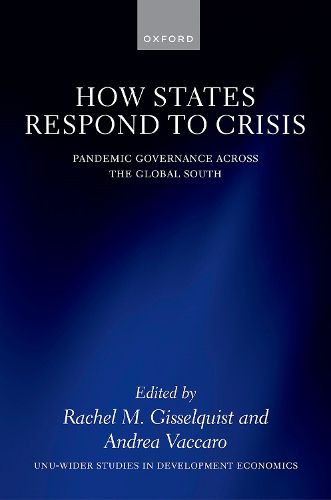Readings Newsletter
Become a Readings Member to make your shopping experience even easier.
Sign in or sign up for free!
You’re not far away from qualifying for FREE standard shipping within Australia
You’ve qualified for FREE standard shipping within Australia
The cart is loading…






This is an open access title available under the terms of a CC BY-NC-SA 3.0 IGO licence. It is free to read at Oxford Academic and is offered as a free PDF download from OUP and selected open access locations.We expect the state to matter in times of crisis, for more 'capable' or 'stronger' states to better provide for and protect their populations. But how is it, precisely, that the quality of the state matters? This volume speaks to this question through comparative study of how diverse states in the Global South responded to the COVID-19 pandemic, the largest global crisis in recent memory. Bringing together insights from quantitative cross-country analysis and detailed country case studies, How States Respond to Crisis analyses the ways in which the quality of the state - in terms of its capacity, authority, and legitimacy - affected pandemic governance and health outcomes. Overall, while the significance of state capacity to deliver public services in effective pandemic response is clear, so too is striking variation among states lacking 'strong' capacity. State legitimacy and authority shed light on this variation, linked in particular to the degree to which governments' responses were evidence-based versus politically driven, and the tenor of citizen compliance with and government enforcement of public health regulations. Seven case study chapters authored by leading scholars of each country provide deep and specific insight into these relationships in Bolivia, Ghana, Nicaragua, Peru, the Philippines, Tanzania, and Vietnam. Extending beyond a literature on the state based heavily on study of Global North contexts, this volume sheds new light on the nature of the state and its role in crisis response and development.
$9.00 standard shipping within Australia
FREE standard shipping within Australia for orders over $100.00
Express & International shipping calculated at checkout
Stock availability can be subject to change without notice. We recommend calling the shop or contacting our online team to check availability of low stock items. Please see our Shopping Online page for more details.
This is an open access title available under the terms of a CC BY-NC-SA 3.0 IGO licence. It is free to read at Oxford Academic and is offered as a free PDF download from OUP and selected open access locations.We expect the state to matter in times of crisis, for more 'capable' or 'stronger' states to better provide for and protect their populations. But how is it, precisely, that the quality of the state matters? This volume speaks to this question through comparative study of how diverse states in the Global South responded to the COVID-19 pandemic, the largest global crisis in recent memory. Bringing together insights from quantitative cross-country analysis and detailed country case studies, How States Respond to Crisis analyses the ways in which the quality of the state - in terms of its capacity, authority, and legitimacy - affected pandemic governance and health outcomes. Overall, while the significance of state capacity to deliver public services in effective pandemic response is clear, so too is striking variation among states lacking 'strong' capacity. State legitimacy and authority shed light on this variation, linked in particular to the degree to which governments' responses were evidence-based versus politically driven, and the tenor of citizen compliance with and government enforcement of public health regulations. Seven case study chapters authored by leading scholars of each country provide deep and specific insight into these relationships in Bolivia, Ghana, Nicaragua, Peru, the Philippines, Tanzania, and Vietnam. Extending beyond a literature on the state based heavily on study of Global North contexts, this volume sheds new light on the nature of the state and its role in crisis response and development.